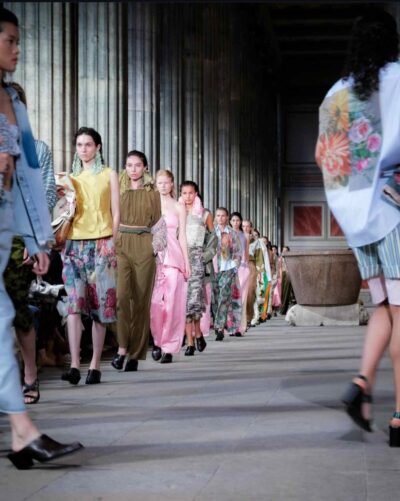Shown at Fashion Weeks in Berlin, Prague, and Chisinau, the “ANTICON” performance by Ukrainian brand DZHUS invites us to witness a meta-modernist version of the Last Supper mystery.
The metaphorical, semi-interactive act evokes a sensation of a spiritual initiation as Irina Dzhus presents her innovative multipurpose Spring/Summer 2025 designs.
DZHUS plays a tricky intellectual game with its audience. In fact, a manifestation of abstract symbolism, the conceptual show provokes associations on the verge of conventionally acceptable.

As a brand with a Ukrainian soul, DZHUS considers its duty to support its countrypeople in this challenging time. Despite the label’s relocation to the EU since the beginning of the war, its SS25 line was fully produced by Ukrainian craftswomen. On top of that, the soundtrack was composed by Hennadii Biliaiev from Kharkiv.
The performance at The Kabbalah Centre Berlin also marked Irina Dzhus’ international debut as a poet. Not a lot of people know that she has been writing since childhood. The author accompanies the mystic act with her intricately written and sharply intimate multilingual verses. When combined, you receive a form of dedication to her sensational experience.
ABOUT DZHUS
DZHUS is a Ukrainian conceptual brand internationally known for its multi-purpose outfits, made of cruelty-free materials. Designer Irina Dzhus’ pattern-making innovations help minimise physical shopping. She also creates a versatile yet sustainable wardrobe from a few transformable garments.
Since the war began, DZHUS has relocated to the EU and has been donating 30% of its profit to Ukrainian animal rights organisations. From the day of its launch in 2010, DZHUS is a vegetarian-friendly brand and uses only ethical materials. In 2019, DZHUS won the Cruelty-free Fashion prize at Best Fashion Awards Ukraine.
Initially designed as womenswear, many of DZHUS
garments have unisex aesthetics and fit. DZHUS incorporates gender representation dilemmas in the core of its design. The main idea is to challenge the social standards and glorify human physique in its versatility.
Among the brand’s clients are American avant-garde musicians Zola Jesus and EYIBRA, and Eurovision-2016 winner, Jamala from Ukraine. The fashion house has collaborated with such movies as The Hunger Games and Star Trek Discovery as well as leading beauty brands, Saco and Davines.
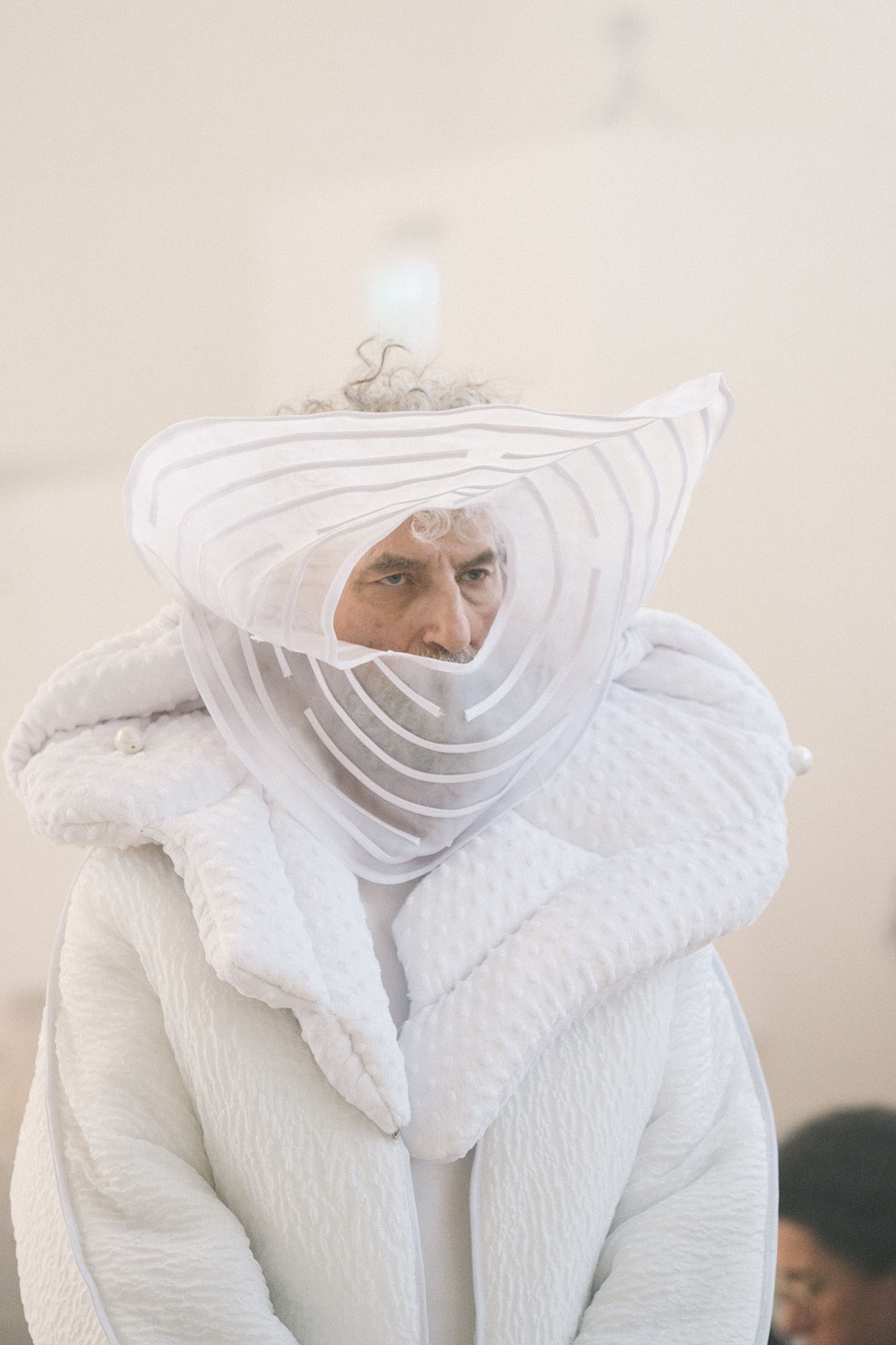
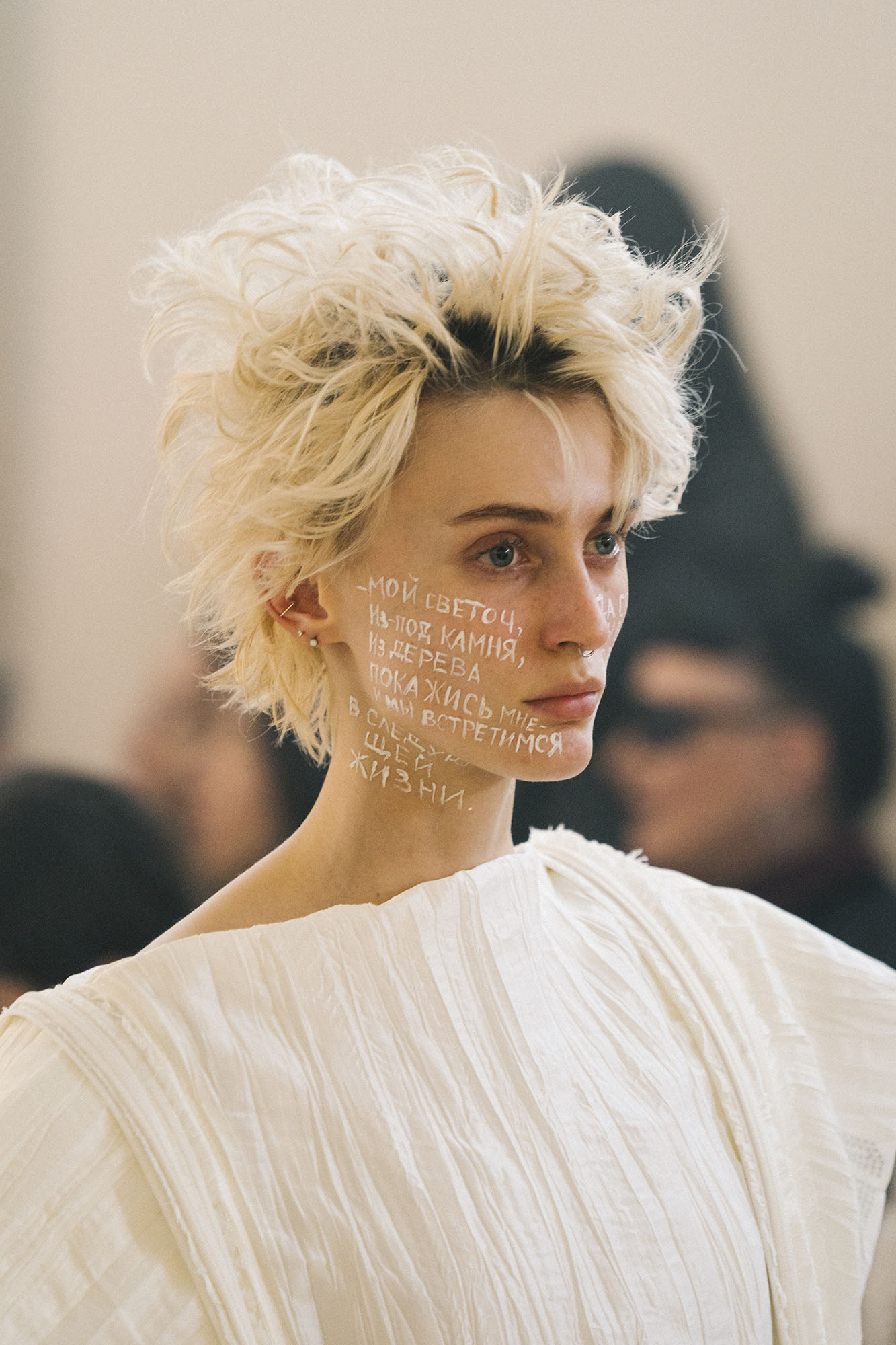
Irina Dzhus’ creations are extremely personal as she translates ‘patterns into patterns’ in the mode of self-rediscovery and self-reinvention. The artist
redirectsher intimate struggleinto avant-garde design solutions in a sharply literal way.
“Can finding ‘where you belong’ in life replace the essential feeling of home?”
Irina Dzhus
Genuine and straightforward throughout its entire 14-year history, DZHUS missions at contributing innovation into the fashion industry. Plus, the brand breaks established stereotypes about animal-friendly and eco-oriented design. DZHUS aims at popularising ethical fashion through its emblematic eye-catching yet exquisitely intellectual allegories.
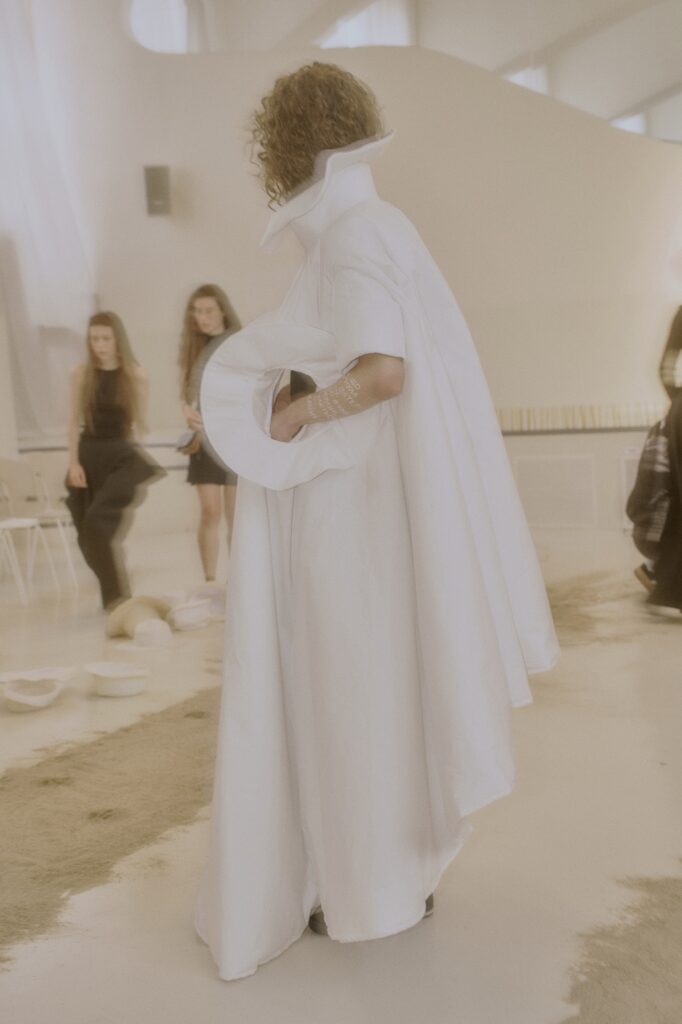
DZHUS SS25 “ANTICON” COLLECTION PT.1
The SS25 line speculates on the ‘Utopia codes’ generated by humanity in aspiration to program happiness. While Irina Dzhus continues to decipher her own personal trauma, she saturates the “ANTICON” collection with narratives of sociocultural conformism. As frustration tends to grow on expectations, the creator ironises about the conventional symbolism throughout the entire history of mankind.
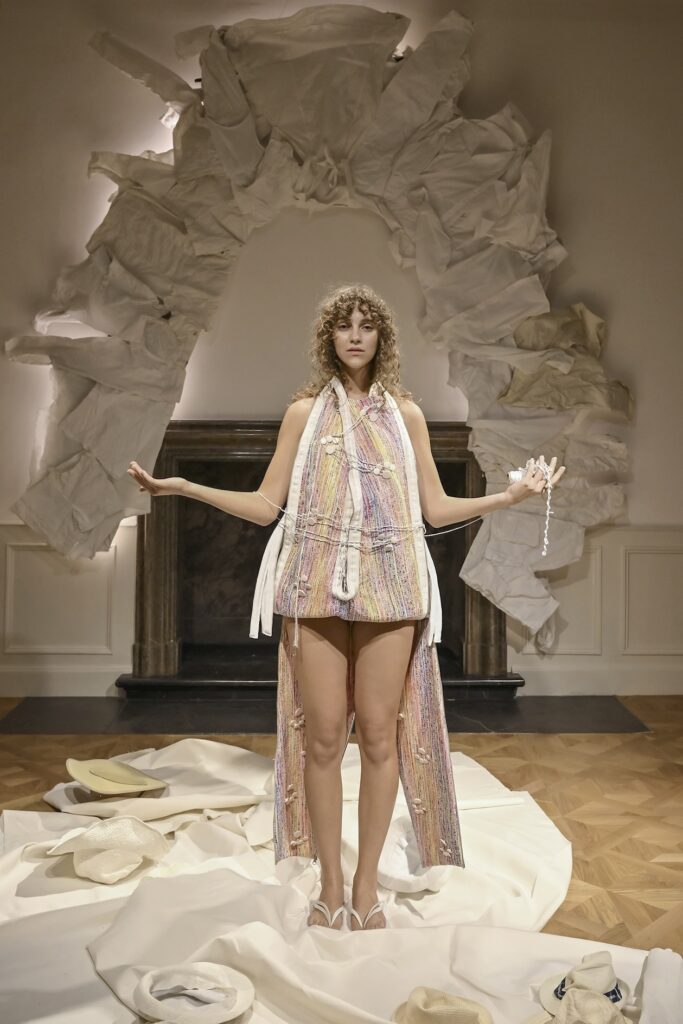
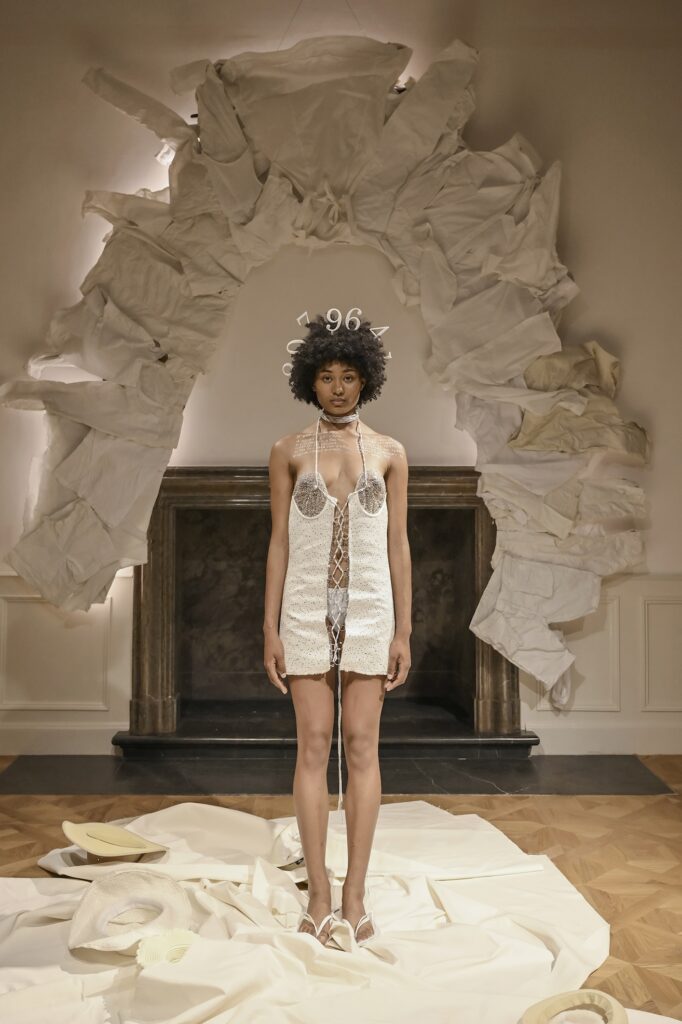
Irina points to a correlation between a natural desire for self-discovery and the urge for homecoming – and reflects with an open question: “Can finding ‘where you belong’ in life replace the essential feeling of home?”. Struggling with an intimate drama, Irina Dzhus defines her own escapist experience as ‘inter-refuge’.
She admits that the civilisation’s eclectic semantics database may well be exploited to pave a path to a subjective idyll. Thus, any sign, term, or notion is a metaphysical source of power that can serve as a vector to ‘self-settlement’. It is a strategy for coping with existential dilemmas.

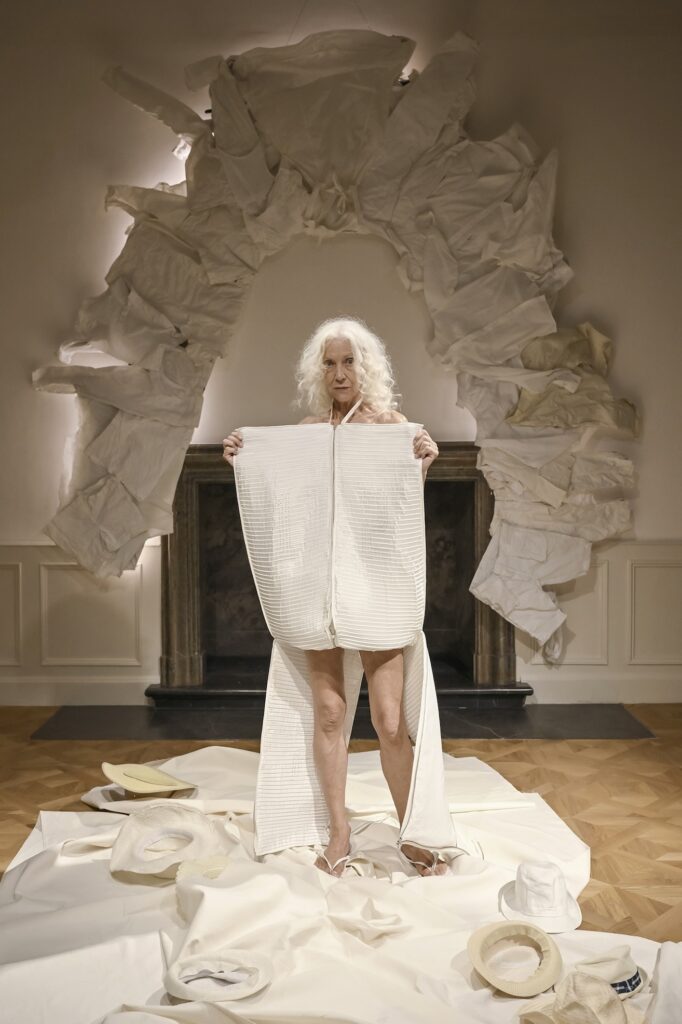
Irina Dzhus pays tribute to the world’s declared encoding systems, from spirituality to commodity. She desaturates the chromatic spectrum, replacing colours with abbreviations. The society’s self-consumerism is traced to gastronomy-related sacraments typical for all the major religions.
Thus, a series of DZHUS SS25 ensembles is inspired by ritual table setting. The repetitive pattern modules also allude on this ‘autophagia’ phenomenon. In this sense, a shape is indivisible from its antipode, a ‘counter-shape’, as they interact and co-nourish.
As she refers to Gnosticism, Kabbalah, Judaism, official and alternative Christian teachings, Irina Dzhus admits the burden of personal values and duties. Stoicism and self-sufficiency are translated through the object=subject’ statement, embodied in multifunctional clothing items.
DZHUS believes that whichever chosen conventional system in reference to something remains relevant as long as its waymarks show a way out of desperation.
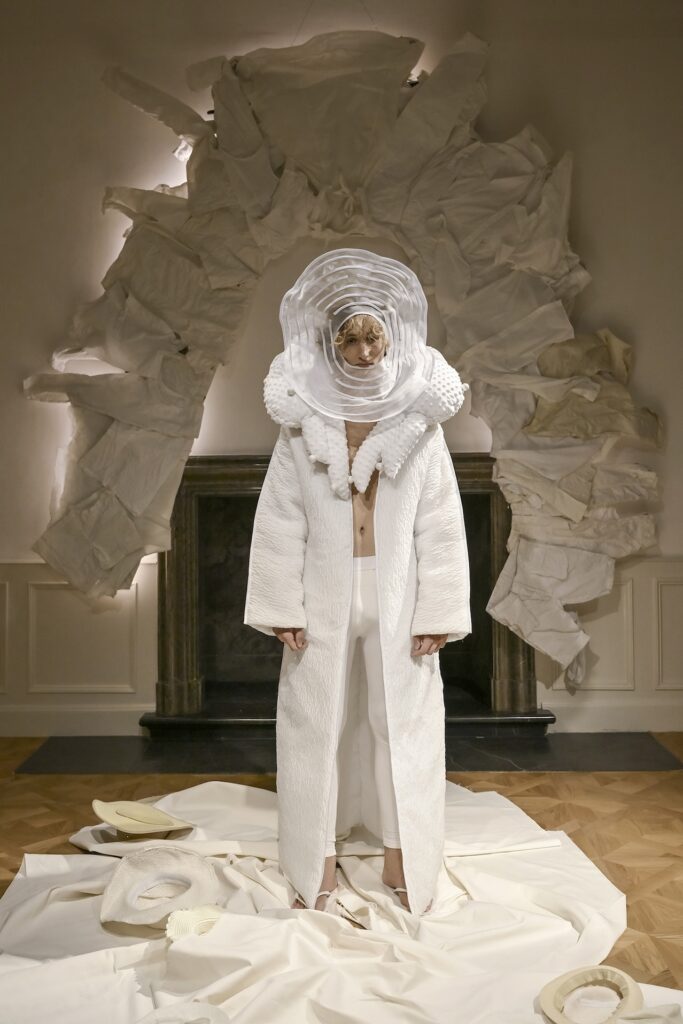
PT.2
Furthermore, randomised references may well (if not better) lead to a destination point. The designer encodes the rainbow in blank, quilted surfaces. Leaving the garments’ outer layer pure, she embellishes pockets and lining with rhinestones and jewellery. As a result, she is commemorating her own experience of escaping the war in Ukraine through a tribute to the heartbreaking Holocaust stories.
The labyrinth leitmotif is dedicated to the Sinai wanderers driven by a spirit of homecoming. Unexpectedly, colours pop from underneath the clothing, as DZHUS paints the ‘wrong’ side in the rainbow gradient. This ‘secret’ splash of pigments amidst the total white collection carries a life-asserting message. In other words, it is suggesting an insight as a route to home, joy, and therefore, fulfilment.
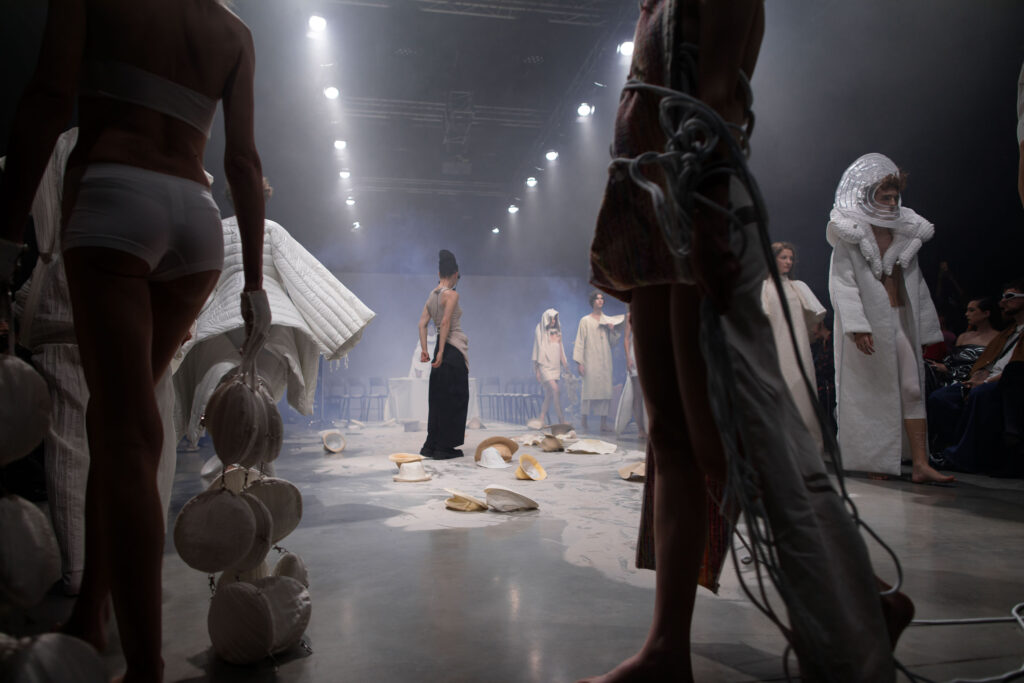
Compassionate to animals in the first place, Irina expresses indignation about the society’s dualistic approach: from treating them as food to idealistic
speculations about pets’ afterlife. Not only can we notice zoomorphic elements from Byzantine iconography, but also tiny paw prints on DZHUS’ rainbow.
Glorifying a reunion with our true self, DZHUS flirts with the gender stereotypes, fetishising the lingerie leitmotif and corpcore, deconstructing the traditional social roles and accentuating their fluidity. While white sartorial trousers transform into an iridescent corset, DZHUS does not stop there and incorporates wearability into homeware objects. Spoiler: a tablecloth set with serving appears to be a flat-cut cape.
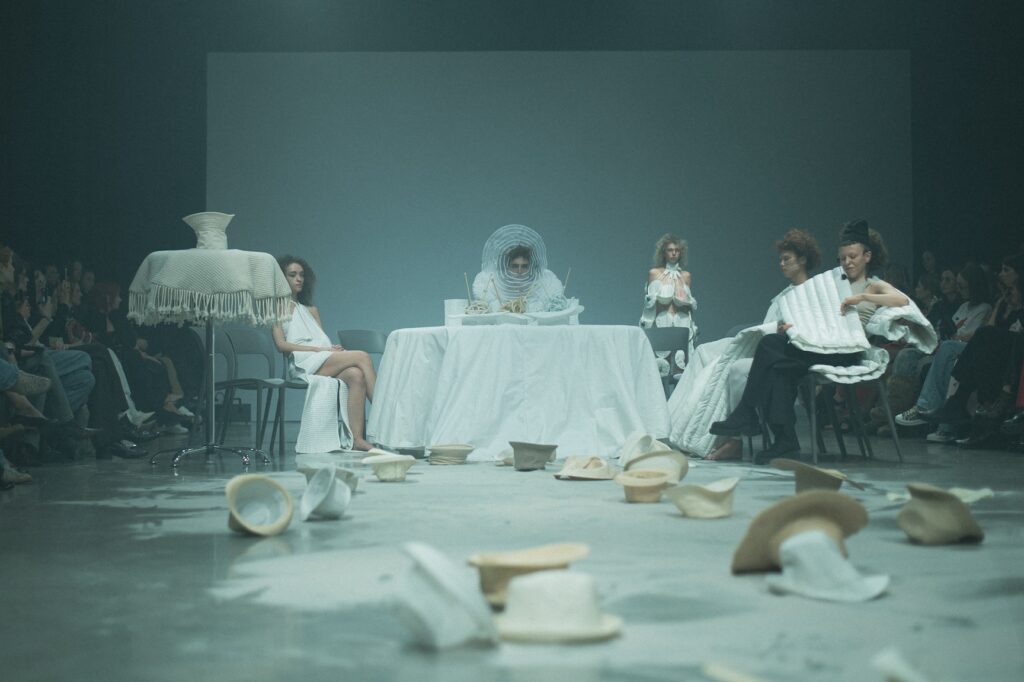
Follow Irina Dzhus and DZHUS
more fashion features here
Get our latest print 350page + book








